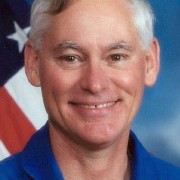Mike Mullane Speaker Biography
Keynote speaker Colonel Mike Mullane was born September 10, 1945 in Wichita Falls, Texas but spent much of his youth in Albuquerque, New Mexico, where he currently resides. Upon his graduation from West Point in 1967, he was commissioned in the United States Air Force. As a Weapon Systems Operator aboard RF-4C Phantom aircraft, he completed 134 combat missions in Vietnam. He holds a master of science degree in aeronautical engineering from the Air Force Institute of Technology and is also a graduate of the Air Force Flight Test Engineer School at Edwards Air Force Base, California.
Countdown To Safety
a safety program by Astronaut Mike Mullane
In his program, “Countdown To Safety”, Astronaut Mullane delivers a powerful message on the individual’s role in keeping themselves and their teams safe in hazardous environments. Mullane introduces this subject with a recount of his own near-death experience in a fighter jet, when he failed to speak up about an unsafe situation. He assumed another crewmember, with more flying time, “knew best” about the safety of their operations. In other words, at a critical moment in a hazardous operation, Mullane surrendered his responsibility for safety to someone else. He became a “safety passenger”. The result was his (and the pilot’s) narrow escape from death during their ejection from the crashing jet. The destruction of a multi-million dollar plane might have been avoided if Mullane had maintained his “safety presence” and voiced his assessment on the dangers of the pilot’s decision. Instead, he assumed he didn’t “count”, that the pilot knew best.
Mullane continues this thread: that each individual brings to their team a unique perspective on safety. Only when every person’s perspective is available for analysis can a team be truly safe. When it comes to safety, everybody counts. Safety is not management’s responsibility or a supervisor’s responsibility or the safety officer’s responsibility. It is EVERYBODY’S responsibility. Never be a “safety passenger”.
Another significant message within Mullane’s “Countdown To Safety” program is his discussion on “Normalization of Deviance”. Astronaut Mullane uses the space shuttle Challenger disaster to define this term, its safety consequences, and how individuals and teams can defend themselves from the phenomenon.
Challenger was the result of a failure of a booster rocket O-ring seal. Viewers will be shocked to know this failure was predicted: “It is my honest and very real fear that if we do not take immediate action to solve the problem, with the O-ring having the number one priority, then we stand in jeopardy of losing a flight along with all the launch pad facilities.” (From a NASA-contractor memo dated six months prior to Challenger).
When a burn-damaged O-ring (a criticality 1 deviance) was first observed following the second shuttle mission, NASA, under enormous schedule pressure, convinced themselves the problem could be fixed with minor modifications to booster assembly procedures and that a grounding the fleet (required for a criticality 1 deviance) was not necessary.
When the next several missions flew without O-ring anomalies, the correctness of the decision to continue operations was reinforced. However, over the following several years, more cases of O-ring sealing problems were observed in the returned boosters but with each successful flight the false feedback that it was safe to continue flight operations was strengthened. In other words, the absence of something bad happening was being falsely interpreted as an indication that the team’s actions were safe when, in fact, it was mere random chance that a disaster hadn’t occurred. The team had gotten away with accepting a criticality 1 deviance so many times, the deviance had been normalized into the team’s decision-making process. Challenger was a “predictable surprise”.
After dramatically defining “Normalization of Deviance”, Astronaut Mullane continues with an explanation of how individuals and teams can defeat this dangerous phenomenon through these practices: recognizing one’s vulnerability to it; making it a religion to “plan the work and work the plan”; considering one’s instincts; and, archiving and periodically reviewing near-misses and disasters so the corporate memory never fades. (Mullane explains that the loss of the space shuttle Columbia…17 years after Challenger…was a repeat of “Normalization of Deviance”. NASA’s corporate memory had faded over those 17 years.)
The messages delivered in “Countdown To Safety” are reinforced with rarely seen NASA video and slides. The program is hard-hitting, fast paced and, in places, very humorous. It is certain to open the eyes of every viewer to their individual criticality to team safety.
ABSTRACT OF “COUNTDOWN TO TEAMWORK”
by Astronaut Mike Mullane
In “Countdown To Teamwork” Astronaut Mullane delivers a hard-hitting, substantive teamwork and leadership program that is also wonderfully entertaining. (In places the content is laugh-out-loud funny.) The program centers on the following fundamentals:
Guarding against a "Normalization of Deviance"
Normalization of deviance is a long term phenomenon in which individuals or teams repeatedly accept a lower standard of performance until that lower standard becomes the “norm”. Usually, the acceptance of the lower standard occurs because the individual/team is under pressure (budget, schedule, etc.) and perceives it will be too difficult to adhere to the expected standard. Their intention may be to revert to the higher standard when this period of pressure passes. However, by “getting away” with the deviation, it is likely they will do the same thing when the same stressful circumstances arise again. Over time, the individual/team fails to see their actions as deviant. Normalization of deviance leads to “predictable surprises” which are invariably disastrous to the team.
Mullane uses the Challenger tragedy to make this point. Under tremendous schedule pressures the NASA team accepted a lower standard of performance on the solid rocket booster O-rings, i.e., they accepted heat damage that was never expected. The team slowly fell into the trap of believing the absence of disaster when the deviance was observed meant the deviance was acceptable. The lower standard became the “norm”. By the dawn of Challenger, the NASA team had gotten away with O-ring damage so many times that the original standard, in which ANY O-ring damage had been defined as intolerable deviance, was marginalized. A “predictable surprise”, i.e., a deadly disaster, resulted.
Responsibility
The power of all teams resides in the uniqueness of the team members, in their diversity of life experiences which yields a diversity of insights into team situations. When individuals become “passengers” and don’t put their unique perspectives on the table for the team and leadership to consider, the team will suffer. Mullane uses a personal experience to drive home the dangers of becoming a “passenger”. As a new crewmember in a 2-place fighter jet, he noted a safety situation but assumed the experienced pilot in command knew what he was doing when he elected to continue the mission. Ultimately Mullane and the pilot had to eject from the crashing plane. Having narrowly escaped death because of it, Mullane is intimately familiar with the dangers of team members slipping into a “passenger” mode. "One person with courage forms a majority", is a quote by former President Andrew Jackson that Mullane will use in this discussion.
Everyone has a sacred responsibility to get their unique perspectives on the table for the leadership to consider; to never assume somebody else is going to fill in for them. Leaders have a sacred responsibility to empower the voices of their people so that no one is allowed to slip into a passenger mode.
Mullane closes this discussion with a real world example of how a medical doctor at NASA (not an engineer or astronaut) had the best solution for an engineering problem associated with the post-Challenger shuttle bailout system. This is an example of how great ideas can exist in the minds of people who are not considered the experts on a particular issue.
Courageous Self-Leadership
Most audiences are shocked to learn how ordinary Mullane was. People assume because he is an astronaut now, that in his youth, he was a super-child, destined for great success. That is not the case. Mullane uses slides and video to prove he wasn't a child genius. He wasn't a high school sports star. He didn't date the homecoming queen. He wasn’t popular. Yet he realized a lifetime dream through the practice of self-leadership. Every individual and team has an “edge of a performance envelope”. That edge is much further out than individuals and teams realize and they find it through the practice of self-leadership.
Self-leaders set very lofty goals, accept the unchangeable, make mid-course corrections around obstacles and stay focused on the goal. Mullane develops this philosophy of self-leadership: "Success isn't a final destination. It's a continuous life journey of working toward successively higher goals for yourself and your teams."
Countdown To Teamwork is remarkably inspirational and humorous. The audience will come away from the program with a renewed sense of their potential and the potential of their teams.
The Lighter Side of Spaceflight
by Astronaut Mike Mullane
In his program, The Lighter Side of Spaceflight, Astronaut Mike Mullane will take the audience on a uniquely revealing, captivating and hilarious space journey. Using spectacular video and slides he will answer everybody’s space questions: What does a shuttle launch feel like?...How does an astronaut deal with the incredible fear of launch?...How do you sleep, bathe, eat, drink, etc.?....What do you see from space?...And, of course, he will answer the top two questions that astronauts are ever asked:
Number 1: How does the space toilet work?
Number 2: Has he seen any UFOs or aliens?
The answers to these questions and many, many more are lavishly wrapped with inside, hilarious stories and supported with amazing video.
The audience will not only be thoroughly entertained by The Lighter Side of Spaceflight but will they will also find Mullane’s message on goal setting and achievement to be powerfully inspirational. Most audiences are shocked to learn how ordinary Mullane was. People assume, because he is an astronaut now, that in his youth, he was a super-child, destined for great success. That is not the case. Mullane uses slides and video to prove he wasn't a child genius. He wasn't a high school sports star. He didn't date the homecoming queen. He wasn’t popular. (He shows a slide of the dedication pages from his high school year book…which are blank except for a single inscription: “You missed Korea but here’s hoping you make Vietnam”.)
Yet, Mullane realized a lifetime dream of becoming an astronaut through the practice of “mapping the edge of his performance envelope”. Every individual and team has an “edge of a performance envelope” and individuals and teams find those “edges” (as team member, leaders, parents, spouses, etc.) through self-challenge and tenacity. (Mullane’s father was rendered a paraplegic at age 33 by polio and Mullane’s story of his parents response to that tragedy while raising six children is the basis of his message on tenacity and goal-achievement in the face of adversity). Mullane develops this philosophy of self-leadership: "Success isn't a final destination. It's a continuous life journey of mapping our performance envelopes through challenge and tenacity."
The Lighter Side of Spaceflight is remarkably inspirational and humorous. The audience will come away from the program with a renewed sense of their potential and the potential of their teams.
















April 29, 2024